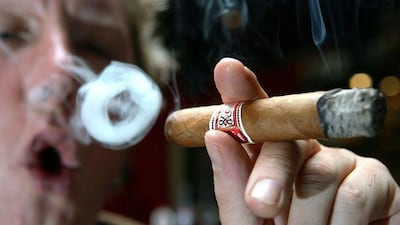My barber does a lucrative sideline in cigars. He's got to really, as he wouldn't make any money otherwise. He spends half his day dozing on his ancient swivel chair, sleeping off the side effects of his medication, while the flow of people who want a haircut has slowed to a trickle. When you can get him to cut your hair, the process is often interrupted by the appearance of paunchy middle-aged men in leisure wear, who furtively pop in to buy a few cut-price tall panatellas.
It is at this point that the clippers are carefully put down next to the basin, and the buyer is escorted into a back room to examine the latest stock. "No robustos then? OK, I'll take the double coronas. The best, you say? OK, done. See you next week." Buyer hurries out and my barber returns, clears his throat and carries on where he left off. I consider it rude to inquire where he gets his supply, and like to think that he in turn appreciates my discretion. For US$4 (Dh14.60), it is great theatre.
Cigars, and the notion of sophistication that follows their blue, pungent haze, could have been made for the shamelessly ostentatious and image-conscious Lebanese. I do not have the figures to hand but we are among the heaviest, if not the heaviest, smokers per capita in the world. (The Cypriots claim to smoke a lot, but I have never noticed it.) Riad Salameh, the governor of the Lebanese central bank, is a famous puffer, the prime minister Saad Hariri is also known to partake.
The list of high-profile Lebanese who spark up is endless and the message simple: the rest of the world might have moved on from such unhealthy and anti-social decadence, but in Lebanon a cigar still conveys power, sophistication and affluence. It helps that Lebanon is a great place to smoke, because, like most of Lebanese life, there are no boundaries. Cigar smokers will often puff away throughout dinner at restaurants without caring a jot for their fellow diners. It is also not uncommon to see them in action pushing a trolley in the supermarket.
But these halcyon days may be numbered with a proposed item of legislation that seeks to ban smoking in public places, and which is currently under debate. If passed, one wonders how successfully it will be enforced, and what impact, negative or otherwise, it will have on Lebanon's $3 billion tourist industry, especially the shisha cafes that are hugely popular with chilled-out Gulf nationals. By and large, the Lebanese are cheerfully indifferent to laws that promote social niceties.
True, there is very little violence, while armed robbery is virtually unheard of. But those rules and regulations that curb what the Lebanese see as their self-expression - driving, smoking, standing in line and parking and so on - are rarely tolerated. That said, we are beginning to come to grips with traffic lights, and even the new parking meters, a joint venture between the government and the private sector, are catching on.
Cynics like me, who scoffed upon hearing of a smoking ban, were reminded by earnest anti-smoking advocates of a similar edict in Gaza that has been in place since December 15. Quite how successful this ban has been is still unclear, as one would have felt the long-term effects of tobacco inhalation would not be a priority in a city that is constantly levelled by the Israeli air force. Still, good on Hamas for trying.
Staying with health concerns, if you believe World Health Organisation statistics, the Lebanese are on average more likely to die from smoking related illnesses (3,000 per year) than from road accidents (600 per year). I am not convinced and I defy anyone, especially those who have gone toe-to-toe with the grim reaper on Lebanon's apocalyptic road network, to tell me that implementing a smoking ban is more urgent than tightening up traffic laws.
More to the point, for a country that places so much emphasis on tourism, it does not appear to care what visitors to Lebanon think of its roads, the cars on them and people who drive them. The argument for dropping import duties on new cars - Lebanese dealers pay prohibitive import tax and 10 per cent value added tax - to spur consumption is one that has been long running. Lebanon's cartel importers argue that cutting duty will see a marked increase in the 20,000 new vehicles sold each year in Lebanon.
The state, they argue, would see revenue levels remain as a result of the increased volume in sales, while the Lebanese would drive newer, safer and environmentally friendlier cars. Such a move would also be good for Lebanon's image. One only has to travel to Cyprus and compare the spanking new Mercedes that wait at Larnaca Airport with the ageing jalopies that cruise for fares at Beirut to see the car importers may have a point.
But then, do we really need any new cars? When all Beirut's new high-rise residential developments are built, the extra traffic they will generate - 1,000 more cars in my square km of Ashrafieh alone - will see the city descend into environmental meltdown. Not only will there be more emissions, the new tower blocks up along the seafront will block the sea breezes that traditionally dissipate the smog.
When faced with this scenario, it hardly matters who smokes what where? At least, that's what my barber would tell you. "A nice robusto for the weekend, sir? Just got them in this morning." Michael Karam is a PR and media consultant based in Beirut

